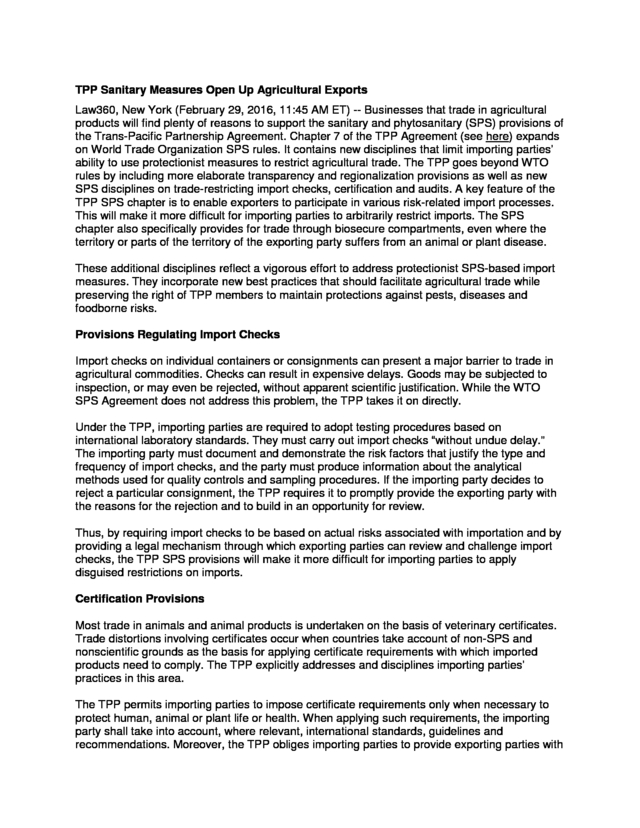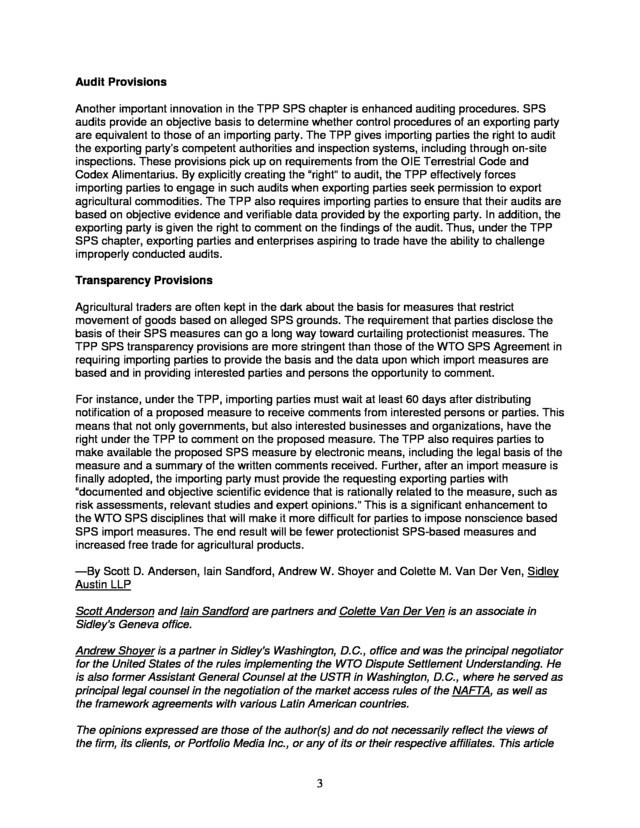Description
TPP Sanitary Measures Open Up Agricultural Exports
Law360, New York (February 29, 2016, 11:45 AM ET) -- Businesses that trade in agricultural
products will find plenty of reasons to support the sanitary and phytosanitary (SPS) provisions of
the Trans-Pacific Partnership Agreement. Chapter 7 of the TPP Agreement (see here) expands
on World Trade Organization SPS rules. It contains new disciplines that limit importing parties’
ability to use protectionist measures to restrict agricultural trade. The TPP goes beyond WTO
rules by including more elaborate transparency and regionalization provisions as well as new
SPS disciplines on trade-restricting import checks, certification and audits.
A key feature of the TPP SPS chapter is to enable exporters to participate in various risk-related import processes. This will make it more difficult for importing parties to arbitrarily restrict imports. The SPS chapter also specifically provides for trade through biosecure compartments, even where the territory or parts of the territory of the exporting party suffers from an animal or plant disease. These additional disciplines reflect a vigorous effort to address protectionist SPS-based import measures. They incorporate new best practices that should facilitate agricultural trade while preserving the right of TPP members to maintain protections against pests, diseases and foodborne risks. Provisions Regulating Import Checks Import checks on individual containers or consignments can present a major barrier to trade in agricultural commodities.
Checks can result in expensive delays. Goods may be subjected to inspection, or may even be rejected, without apparent scientific justification. While the WTO SPS Agreement does not address this problem, the TPP takes it on directly. Under the TPP, importing parties are required to adopt testing procedures based on international laboratory standards.
They must carry out import checks “without undue delay.” The importing party must document and demonstrate the risk factors that justify the type and frequency of import checks, and the party must produce information about the analytical methods used for quality controls and sampling procedures. If the importing party decides to reject a particular consignment, the TPP requires it to promptly provide the exporting party with the reasons for the rejection and to build in an opportunity for review. Thus, by requiring import checks to be based on actual risks associated with importation and by providing a legal mechanism through which exporting parties can review and challenge import checks, the TPP SPS provisions will make it more difficult for importing parties to apply disguised restrictions on imports. Certification Provisions Most trade in animals and animal products is undertaken on the basis of veterinary certificates. Trade distortions involving certificates occur when countries take account of non-SPS and nonscientific grounds as the basis for applying certificate requirements with which imported products need to comply. The TPP explicitly addresses and disciplines importing parties’ practices in this area. The TPP permits importing parties to impose certificate requirements only when necessary to protect human, animal or plant life or health.
When applying such requirements, the importing party shall take into account, where relevant, international standards, guidelines and recommendations. Moreover, the TPP obliges importing parties to provide exporting parties with . the rationale for any attestations or information required on the certificate. In sum, the TPP provides a strong mechanism through which exporting parties can hold importing parties accountable for including unnecessary import conditions on the certificate. This makes it more difficult for importing parties to limit imports through abuse of certification requirements. Regionalization Provisions The TPP’s regionalization provisions will make it more difficult for importing parties to impose countrywide bans when disease outbreaks occur in exporting countries. Unlike the WTO SPS Agreement, the TPP explicitly requires importing parties to recognize “compartmentalization.” Compartmentalization is a relatively new procedure that enables exporting enterprises with high levels of biosecurity to continue to export from highly biosecure farms and slaughterhouses, even when the enterprise is located in a region or country considered to be infected by disease. While the obligation to recognize compartments is incorporated in the relevant international standards (e.g., the OIE Terrestrial Code) and could be considered implied under the WTO SPS Agreement, it has not been explicitly addressed by the WTO. Thus, at a minimum, the TPP establishes importing parties’ obligation to recognize compartmentalization as an alternative to regionalization. The TPP balances the obligations in respect of compartmentalization by clarifying that the importing party’s obligation to recognize compartments or regions is not “immediate.” Indeed, importing parties have a “reasonable period of time” to assess a proposed zone or compartment. The TPP SPS chapter also recognizes that insufficient evidence of effectively established zones or compartments may lead to a decision not to accept the proposed zone or compartment.
The importing party is required, however, to provide the exporting party with a determination and, when the decision is negative, with the rationale for the determination. Moreover, upon request, the importing party must provide information about the nature and timing of its regionalization process and cooperate when a positive regionalization determination is revoked. Thus, the TPP presents a fine-tuned and transparent regionalization process, providing diseaseinfected exporting Parties with various options to continue to export. Science and Risk Analysis Many SPS-based import bans and restrictions do not conform to the applicable international standards, yet the importing country fails to provide a science-based risk assessment, as required under the WTO SPS Agreement. Significantly, the TPP risk assessment provisions effectively force an importing party to reveal quickly whether it has conducted a risk assessment and, if it has, to produce the data and analysis upon which it is based. Further, in addition to receiving the risk assessment, the exporting country and interested parties (e.g., private companies involved in agricultural commodity trade) have rights to (i) comment on the risk analysis conducted by the importing party and (ii) receive an explanation concerning the relevance of the information requested from the exporting party.
This allows exporting countries and companies to play a more proactive role in an importing party’s risk assessment. In practical terms, this will make it much more difficult for importing parties to impose arbitrary measures going beyond international standard requirements that are not based on a risk assessment. 2 . Audit Provisions Another important innovation in the TPP SPS chapter is enhanced auditing procedures. SPS audits provide an objective basis to determine whether control procedures of an exporting party are equivalent to those of an importing party. The TPP gives importing parties the right to audit the exporting party’s competent authorities and inspection systems, including through on-site inspections. These provisions pick up on requirements from the OIE Terrestrial Code and Codex Alimentarius.
By explicitly creating the “right” to audit, the TPP effectively forces importing parties to engage in such audits when exporting parties seek permission to export agricultural commodities. The TPP also requires importing parties to ensure that their audits are based on objective evidence and verifiable data provided by the exporting party. In addition, the exporting party is given the right to comment on the findings of the audit.
Thus, under the TPP SPS chapter, exporting parties and enterprises aspiring to trade have the ability to challenge improperly conducted audits. Transparency Provisions Agricultural traders are often kept in the dark about the basis for measures that restrict movement of goods based on alleged SPS grounds. The requirement that parties disclose the basis of their SPS measures can go a long way toward curtailing protectionist measures. The TPP SPS transparency provisions are more stringent than those of the WTO SPS Agreement in requiring importing parties to provide the basis and the data upon which import measures are based and in providing interested parties and persons the opportunity to comment. For instance, under the TPP, importing parties must wait at least 60 days after distributing notification of a proposed measure to receive comments from interested persons or parties.
This means that not only governments, but also interested businesses and organizations, have the right under the TPP to comment on the proposed measure. The TPP also requires parties to make available the proposed SPS measure by electronic means, including the legal basis of the measure and a summary of the written comments received. Further, after an import measure is finally adopted, the importing party must provide the requesting exporting parties with “documented and objective scientific evidence that is rationally related to the measure, such as risk assessments, relevant studies and expert opinions.” This is a significant enhancement to the WTO SPS disciplines that will make it more difficult for parties to impose nonscience based SPS import measures.
The end result will be fewer protectionist SPS-based measures and increased free trade for agricultural products. —By Scott D. Andersen, Iain Sandford, Andrew W. Shoyer and Colette M.
Van Der Ven, Sidley Austin LLP Scott Anderson and Iain Sandford are partners and Colette Van Der Ven is an associate in Sidley's Geneva office. Andrew Shoyer is a partner in Sidley's Washington, D.C., office and was the principal negotiator for the United States of the rules implementing the WTO Dispute Settlement Understanding. He is also former Assistant General Counsel at the USTR in Washington, D.C., where he served as principal legal counsel in the negotiation of the market access rules of the NAFTA, as well as the framework agreements with various Latin American countries. The opinions expressed are those of the author(s) and do not necessarily reflect the views of the firm, its clients, or Portfolio Media Inc., or any of its or their respective affiliates. This article 3 .
is for general information purposes and is not intended to be and should not be taken as legal advice. All Content © 2003-2016, Portfolio Media, Inc. 4 .
A key feature of the TPP SPS chapter is to enable exporters to participate in various risk-related import processes. This will make it more difficult for importing parties to arbitrarily restrict imports. The SPS chapter also specifically provides for trade through biosecure compartments, even where the territory or parts of the territory of the exporting party suffers from an animal or plant disease. These additional disciplines reflect a vigorous effort to address protectionist SPS-based import measures. They incorporate new best practices that should facilitate agricultural trade while preserving the right of TPP members to maintain protections against pests, diseases and foodborne risks. Provisions Regulating Import Checks Import checks on individual containers or consignments can present a major barrier to trade in agricultural commodities.
Checks can result in expensive delays. Goods may be subjected to inspection, or may even be rejected, without apparent scientific justification. While the WTO SPS Agreement does not address this problem, the TPP takes it on directly. Under the TPP, importing parties are required to adopt testing procedures based on international laboratory standards.
They must carry out import checks “without undue delay.” The importing party must document and demonstrate the risk factors that justify the type and frequency of import checks, and the party must produce information about the analytical methods used for quality controls and sampling procedures. If the importing party decides to reject a particular consignment, the TPP requires it to promptly provide the exporting party with the reasons for the rejection and to build in an opportunity for review. Thus, by requiring import checks to be based on actual risks associated with importation and by providing a legal mechanism through which exporting parties can review and challenge import checks, the TPP SPS provisions will make it more difficult for importing parties to apply disguised restrictions on imports. Certification Provisions Most trade in animals and animal products is undertaken on the basis of veterinary certificates. Trade distortions involving certificates occur when countries take account of non-SPS and nonscientific grounds as the basis for applying certificate requirements with which imported products need to comply. The TPP explicitly addresses and disciplines importing parties’ practices in this area. The TPP permits importing parties to impose certificate requirements only when necessary to protect human, animal or plant life or health.
When applying such requirements, the importing party shall take into account, where relevant, international standards, guidelines and recommendations. Moreover, the TPP obliges importing parties to provide exporting parties with . the rationale for any attestations or information required on the certificate. In sum, the TPP provides a strong mechanism through which exporting parties can hold importing parties accountable for including unnecessary import conditions on the certificate. This makes it more difficult for importing parties to limit imports through abuse of certification requirements. Regionalization Provisions The TPP’s regionalization provisions will make it more difficult for importing parties to impose countrywide bans when disease outbreaks occur in exporting countries. Unlike the WTO SPS Agreement, the TPP explicitly requires importing parties to recognize “compartmentalization.” Compartmentalization is a relatively new procedure that enables exporting enterprises with high levels of biosecurity to continue to export from highly biosecure farms and slaughterhouses, even when the enterprise is located in a region or country considered to be infected by disease. While the obligation to recognize compartments is incorporated in the relevant international standards (e.g., the OIE Terrestrial Code) and could be considered implied under the WTO SPS Agreement, it has not been explicitly addressed by the WTO. Thus, at a minimum, the TPP establishes importing parties’ obligation to recognize compartmentalization as an alternative to regionalization. The TPP balances the obligations in respect of compartmentalization by clarifying that the importing party’s obligation to recognize compartments or regions is not “immediate.” Indeed, importing parties have a “reasonable period of time” to assess a proposed zone or compartment. The TPP SPS chapter also recognizes that insufficient evidence of effectively established zones or compartments may lead to a decision not to accept the proposed zone or compartment.
The importing party is required, however, to provide the exporting party with a determination and, when the decision is negative, with the rationale for the determination. Moreover, upon request, the importing party must provide information about the nature and timing of its regionalization process and cooperate when a positive regionalization determination is revoked. Thus, the TPP presents a fine-tuned and transparent regionalization process, providing diseaseinfected exporting Parties with various options to continue to export. Science and Risk Analysis Many SPS-based import bans and restrictions do not conform to the applicable international standards, yet the importing country fails to provide a science-based risk assessment, as required under the WTO SPS Agreement. Significantly, the TPP risk assessment provisions effectively force an importing party to reveal quickly whether it has conducted a risk assessment and, if it has, to produce the data and analysis upon which it is based. Further, in addition to receiving the risk assessment, the exporting country and interested parties (e.g., private companies involved in agricultural commodity trade) have rights to (i) comment on the risk analysis conducted by the importing party and (ii) receive an explanation concerning the relevance of the information requested from the exporting party.
This allows exporting countries and companies to play a more proactive role in an importing party’s risk assessment. In practical terms, this will make it much more difficult for importing parties to impose arbitrary measures going beyond international standard requirements that are not based on a risk assessment. 2 . Audit Provisions Another important innovation in the TPP SPS chapter is enhanced auditing procedures. SPS audits provide an objective basis to determine whether control procedures of an exporting party are equivalent to those of an importing party. The TPP gives importing parties the right to audit the exporting party’s competent authorities and inspection systems, including through on-site inspections. These provisions pick up on requirements from the OIE Terrestrial Code and Codex Alimentarius.
By explicitly creating the “right” to audit, the TPP effectively forces importing parties to engage in such audits when exporting parties seek permission to export agricultural commodities. The TPP also requires importing parties to ensure that their audits are based on objective evidence and verifiable data provided by the exporting party. In addition, the exporting party is given the right to comment on the findings of the audit.
Thus, under the TPP SPS chapter, exporting parties and enterprises aspiring to trade have the ability to challenge improperly conducted audits. Transparency Provisions Agricultural traders are often kept in the dark about the basis for measures that restrict movement of goods based on alleged SPS grounds. The requirement that parties disclose the basis of their SPS measures can go a long way toward curtailing protectionist measures. The TPP SPS transparency provisions are more stringent than those of the WTO SPS Agreement in requiring importing parties to provide the basis and the data upon which import measures are based and in providing interested parties and persons the opportunity to comment. For instance, under the TPP, importing parties must wait at least 60 days after distributing notification of a proposed measure to receive comments from interested persons or parties.
This means that not only governments, but also interested businesses and organizations, have the right under the TPP to comment on the proposed measure. The TPP also requires parties to make available the proposed SPS measure by electronic means, including the legal basis of the measure and a summary of the written comments received. Further, after an import measure is finally adopted, the importing party must provide the requesting exporting parties with “documented and objective scientific evidence that is rationally related to the measure, such as risk assessments, relevant studies and expert opinions.” This is a significant enhancement to the WTO SPS disciplines that will make it more difficult for parties to impose nonscience based SPS import measures.
The end result will be fewer protectionist SPS-based measures and increased free trade for agricultural products. —By Scott D. Andersen, Iain Sandford, Andrew W. Shoyer and Colette M.
Van Der Ven, Sidley Austin LLP Scott Anderson and Iain Sandford are partners and Colette Van Der Ven is an associate in Sidley's Geneva office. Andrew Shoyer is a partner in Sidley's Washington, D.C., office and was the principal negotiator for the United States of the rules implementing the WTO Dispute Settlement Understanding. He is also former Assistant General Counsel at the USTR in Washington, D.C., where he served as principal legal counsel in the negotiation of the market access rules of the NAFTA, as well as the framework agreements with various Latin American countries. The opinions expressed are those of the author(s) and do not necessarily reflect the views of the firm, its clients, or Portfolio Media Inc., or any of its or their respective affiliates. This article 3 .
is for general information purposes and is not intended to be and should not be taken as legal advice. All Content © 2003-2016, Portfolio Media, Inc. 4 .

















